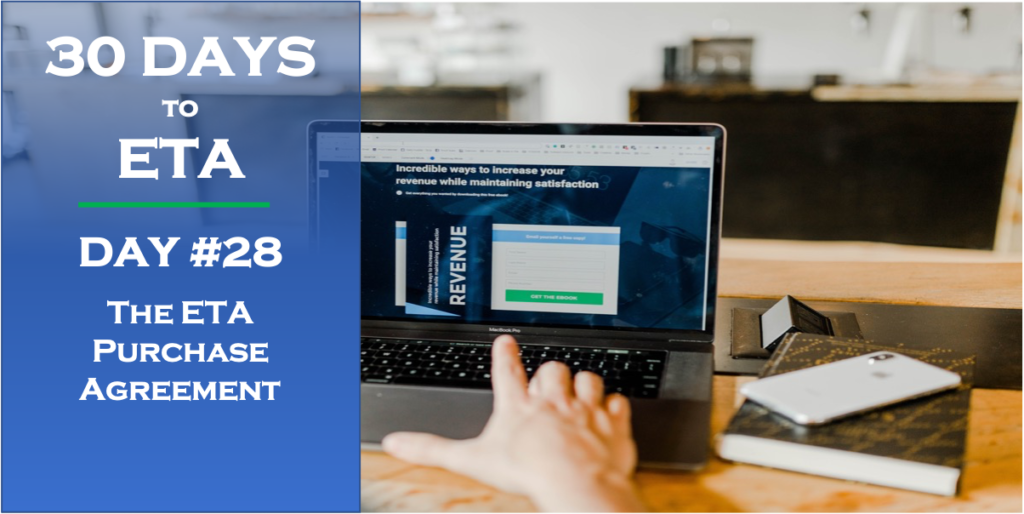If you’ve been reading along in this 30 Days to ETA series, you know that in the Day #27 post I shared that finding a business is good, but being able to fund what you find is even better, something I referred to as ETA Capital (You can read the previous post by CLICKING HERE). So, by this time in your Entrepreneurship Through Acquisition (ETA) journey you have found a business, determined how you are going to fund it, and successfully conducted due diligence under Letter of Intent (LOI)… Now all you need to do is purchase the business. Ok, that’s not all, but that is what’s next. So, in today’s 30 Days to ETA post, we’re going to explore the ETA Purchase Agreement (PA)… Enjoy!
The ETA Purchase Agreement (PA)
The ETA Purchase Agreement (PA), or Purchase of Business Agreement, is an official contract used to legally buy any type of business to another person/entity. The ETA Purchase Agreement can be used to sell only some of a business’ assets or shares, but not the entire business. In these cases, be sure you include all of the details regarding what assets or shares are being sold and to whom.
A Business Purchase Agreement acts as an official record of the sale and purchase, and also serves as proof of ownership for the buyer. At Tip of the Spear Ventures’ Mergers & Acquisitions division, we typically have our legal representative from our ETA Professional Team create the document for use (I highly recommend that you do so as well – NOTE – This is not something that you want to secure a template from the internet to complete by yourself! I’ve seen way too many DIY’ers who believe that they can save a buck here or there, only to end up paying tens of thousands of dollars to overcome mistakes made).
Now is not the time to get cheap/creative… Bring your ETA Professional Team Attorney into the mix to create your ETA Purchase Agreement!
Sam Palazzolo, Managing Director @ Tip of the Spear Ventures
1. What is an ETA Purchase Agreement (PA)?
You should think of the ETA Purchase Agreement (PA) as being like a bill of sale that documents the purchase of the business. Either assets of the business or shares in the company are typically transferred as a result of the ETA PA. As a legally enforceable contract, the ETA PA ensures that both the buyer and seller follow through with their promises and creates an opportunity to confirm the terms and conditions (T&Cs) of the transaction.
A Business Purchase Agreement typically will identify the following basic elements:
- Business: describe the company, assets, and/or stock being transferred
- Closing Date: when the Buyer will pay and the Seller will deliver the assets
- Confidentiality: both parties agree to not share the details of the business transfer
- Non-Competition: the seller promises to not compete with the business
- Non-Solicitation: the seller will not hire any of their former employees away
- Parties: identify the Seller of the business and the Buyer
- Purchase Price: payment for the transfer, including any deposits or financing
- Representations & Warranties: each party is relying on statements of fact or promises about the assets, business, and authority to enter into the transaction
It’s important to equip yourself with the skills to develop a solid negotiation strategy in order to secure the best outcome from a business deal. Negotiating the T&Cs of the sale of a business and document the transaction with the ETA PA at the closing.
As a reference, people often call the ETA PA by other names, such as:
- Agreement for Purchase and Sale of Servicing
- Agreement of Purchase and Sale of Business Assets
- Agreement to Sell Business
- Asset Purchase Agreement
- Bill of Sale and Assignment and Assumption Agreement
- Business Sale Agreement
- Business Sale Contract
- Business Transfer Agreement
- Contract for Sale of Business
- Purchase of Business Agreement
- Sale of Business Agreement
- Share and Asset Purchase Agreement
- Small Business Purchase Agreement
SUMMARY
In today’s ’30 Days to ETA’ post, we explored the ETA Purchase Agreement (PA). By this time in your Entrepreneurship Through Acquisition (ETA) journey you have found a business, determined how you are going to fund it, conducted due diligence under Letter of Intent (LOI)… Now all you need to do is purchase the business. We’re entering the homestretch of our series!
Sam Palazzolo
NOTE – Seek legal counsel for your Purchase Agreement. It might cost you upfront, but you’ll be glad you did as it will provide you with a solid operating base to work from in the future.
